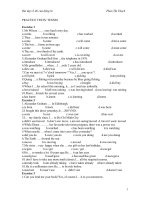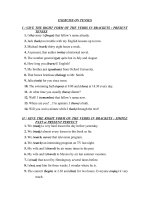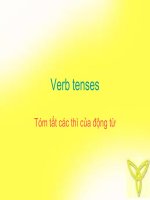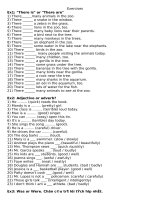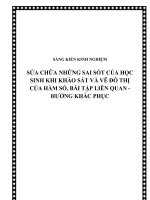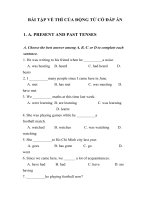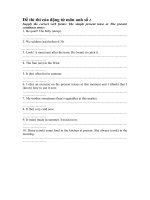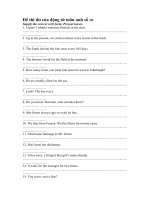thi cua dong tu bai tap
Bạn đang xem bản rút gọn của tài liệu. Xem và tải ngay bản đầy đủ của tài liệu tại đây (130.9 KB, 6 trang )
<span class='text_page_counter'>(1)</span>Week 6 (From 24 September To 29 September 2012 ) 1. THE PRESENT SIMPLE 2. THE PRESENT CONTINUOUS Exercise 1.1. Use the simple present tense to rewrite each sentence as a positive, negative, or question (Dùng thì hiện tại đơn viết lại những câu sau ở 3 dạng: câu khẳng định, phủ định, nghi vấn) Example: He (visit) ______visits _______his parents very often. He doesn’t visit his parents very often Does he visit his parents very often? 1.He (go) _________________to School everyday. ______________________________________________________ _____________________________________________________ 2.She (come) ___________________ from Germany. _____________________________________________________ _____________________________________________________ 3.Daisy usually (go) _____________________ to work by car. _____________________________________________________ _____________________________________________________ 4.We (watch) __________________TV every night. _____________________________________________________ _____________________________________________________ 5.He (walk) __________________to work every day. _____________________________________________________ _____________________________________________________ 6.He (be) ______________________in Ca Mau. _____________________________________________________ _____________________________________________________ 7.They (be) ____________________students. _____________________________________________________ _____________________________________________________ 8.She (wash) ___________________her clothes every Sunday. _____________________________________________________ _____________________________________________________ 9.She (study) ________________English every day. _____________________________________________________ _____________________________________________________ 10.He (want) _________ to become a teacher. _____________________________________________________ _____________________________________________________ Exercise 1.2. Fill in the gaps in the following sentences with one of these verbs in the present simple (Chia động từ trong ngoặc ở thì hiện tại đơn) 1.Ann (speak) ______________German very well. 2.I never (drink) ______________ coffee 3.The swimming pool (open) ______________at 9 o’clock and (close) at 18.30 every day. 4.Bad driving (cause) ______________many accidents. 5.My parents (live) ______________ in a very small flat. 6.The Olympic Games (take place) ______________every four years. 7.They (close)__________________the gym once every year for maintenance work. 8.People who train at sea level (tire)_________________ very quickly at high altitude..
<span class='text_page_counter'>(2)</span> 9.She’s traveling on a scheduled flight which (leave)__________________ at 8.30 tomorrow. 10.The club (own)__________________the land but we’re always playing there . Exercise 1.3. Complete using one of the following (Dùng những từ trong khung để hoàn thành câu) a. I apologize b. I promise c. I insist. d. I recommend. e. I suggest. 1. It’s a nice day. I ______________we go for a walk 2.It won’t tell anybody what you said. ______________ 3. (in a restaurant) You must let me pay for the meal. ______________ 4. ______________for what I said about you. It wasn’t true and I shouldn’t have said it. 5.The new restaurant in Hill street is very good. ______________it Exercise 1.4. Choose the best answer (use the present simple to). (Chọn đáp án đúng dùng thì hiện tại đơn) 1. Mary...............................has English on Monday and Friday. A. usual B. frequent C. usually D. normal 2. Jim sometimes.................................at midnight. A. wake B. woke C. wakes up D. woke up 3. How many lessons do you.........................at school a day. A. read B. watch C. have D. see 4. It often....................me half an hour to clean the kitchen. A. take B. takes C. took D. talking 5. John is not a farmer so he never............................. A. do the transplanting B. do transplanting C. does the transplanting D. did the transplanting 6. John often goes to bed early and......................... up late. A. gets B. get C. got D. to get 7. They sometimes come.......................their neighbours in the evening. A. see B. sees C. seeing D. to see 8. He lives.................17 George street in London. A. on B. in C. at D. inside 9.What time (the banks/ close)……………….. in Britain? A. does- close B. do-close C. does-closes D. does-closes 10. “Where (Martin/ come) from?” A. does-come B. do-come C. is-come D. is-coming Exercise 1.5. Find out one mistake in each sentence then correct it. (Mçi c©u díi ®©y cã mét lçi sai.H·y t×m vµ söa lçi) 1. Many ethnic children doesn't know how to read and write. A B C D 2. She has breakfast at 8.30, then she go to work immediately. A B C D 3. I don’t know what time does she gets up every morning. A B C D 4. What subjects do students to study at Secondary school. A B C D Exercise 1.6. Decide whether the underlined words are in the right positions or not. Correct the sentences which are wrong. (T×m lçi sai (nÕu cã) vµ söa lçi) 1.Tom goes always to work by car..
<span class='text_page_counter'>(3)</span> 2.I have a good memory for faces but I always forget names. 3.Tom gets hardly angry. 4.Tom has always to hurry in the morning because he gets up so late 5.The baby is very good. She seldom cries during the night. 6.I usually am very tired when I get home from work. 7.I usually have a bath when I get home from work. Exercise 1.7. Rewrite the sentences to include the word in brackets. 1.Ann doesn’t smoke. (usually) 2.I don’t have to work on Saturdays. (usually) 3.Does Tom sing when he’s in the bath? (always) 4.Ann is on time for class. (often) 5.Sue comes to class late. (rarely) 6.Tom studies at the library in the evening. (seldom) 7.The weather is hot on July. (usually) 8.Mary takes a bus to school. (never) 9.Bob stays at home in the evening. (sometimes) . Exercise 1.8. Read the passage then answer questions. In England, boys and girls go to school five days a week. They don't go to school on Saturdays and Sundays. Lessons usually begin at 9 o'clock. Each lesson lasts forty five minutes. At 11:15, they stop to have a light meal. Some pupils eat sandwiches or biscuits, some others drink milk. Then they have two lessons more. After that they have a lunch break. Some pupils go home for lunch but many have it at school. In the afternoon they do homework or have a club meeting or play games like football. They go home at 4 o’clock. 1. How many days do boys girls go to school England? 2. What time do lessons usually begin? 3. What do they do in the afternoon? 4. What time do they go home? Exercise 1.9. Read the passage then answer questions. His name's Rob Fellows. He comes from Scotland, but he is a student at a university in the North of England. He is studying French and German, and he can speak the languages quite well. He also knows a little Spanish, so he can speak four languages. He enjoys the course a lot but it's a very hard work. a. What is his name? d. What is he studying? b. What does he do? e. How many languages can he speak? c. Where does he come? Exercise 2.1. Fill in the gaps in the following sentences with one of these verbs in the present continous (Chia động từ trong ngoặc ở thì hiện tại tiếp diễn) 1.I think she (get)__________________better and better at this all the time . 2.The weight he (lift)__________________ now is the equivalent of a small car. 3.She (always/(remind)) __________________ me how much weight I’ve put . 4.All of us (go)__________________to the swimming pool next Saturday. 5.This month I (stay) __________________ at my cousins’ house in the country. 6. Be quiet ! The pupils ( learn ) ........................... 7. Look ! The boy ( run ) ........................... to catch the bus. 8. Where's Linda ? -She ( do ) .................... shopping at the moment. 9. The Browns ( go ) ......................... to the cinema now. 10. Listen ! They ( sing ) ........... an English song. 11. She ( go ) ........... out with friends to night. 12.They ( move ) ..................... to the new house next week..
<span class='text_page_counter'>(4)</span> 13. Richard ( have ) .............. lunch at twelve o'clock. 14. Listen ! Someone (knock ) .............. the door. 15. What you ( do ) ............... this evening? 16. Peter ( go ) .................... on holiday next month. 17. I ( see ) ....................... the doctor this afternoon. 18.Look! The boy (cry). 19.Listen! I (think) someone (knock) at the door Exercise 2.2. Supply the correct form of the verb in the present progressive. (Chia động từ trong ngoặc ở thì hiện tại tiếp diễn) 1.I ( go) ________________to work by bike this week. 2.Tom ( study) _______________more now. 3.Why (not) Mary (wear) _______________her new dress? 4.My father ( take) _______________some medicine. 5.They ( repair) _______________the road today . 6.I can’t hear what you (say) , the traffic ( make) _______________too much noise. 7.She ( bath) _______________the babies. 8.They ( go) _______________ to the cinema tonight. 9.I ( look) _______________for a new tennis racquet. 10.We ( paint) _______________the living room. It’s hard work. 11.The population of the world (rise)_______________very fast 12.Ken is still ill but he (get)_______________better now 13.The world (change)_______________.Things never stay the same. 14.The cost of living (rise/ increase) _______________Every year things are more expensive. 15The economic situation is already bad and it (get)_______________worse Exercise 2.3. Complete the sentences in the simple present and the present progressive. (Chia động từ trong ngoặc ở thì hiện tại tiếp diễn) 1.She/ leave/ home/ 7.00/ every morning. → 2.Jane/ study/ Japanese/ this year. → 3.Mary/ wash/ her hair/ every day. → 4.I/ busy/ moment/./ I/ redecorate/ living room. → 5.The last train/ leave/ the station/ 11.30. → 6.You/ listen/ to the radio/ very often? → 7.She/ know/ 3 words/ spanish. → 8.Sun/ shine/ ./ It/ beautiful day. → 9.The English course/ finish/ December. → 10I/ play/ tennis/ my friends/ Sunday afternoons. →.
<span class='text_page_counter'>(5)</span> Thời hiện tại tiếp diễn: I - FORM. *CHÚ Ý NHỮNG VẤN ĐỀ SAU: V-ing (Doing): Động từ +ING) visiting going, ending, walking, ... Khi thêm -ing sau động từ, có những trường hợp đặc biệt sau: a/ Nếu như đông từ tận cùng bằng một chữ E: chúng ta bỏ chữ E đó đi rồi mới thêm -ing. ex: Ride - Riding (lái - đang lái) b/ Nếu động từ tận cùng có 2 chữ EE, ta thêm -ing bình thường, không bỏ E. ex: See - Seeing. (nhìn - đang nhìn). c/ Nếu động từ tận cùng là IE, chúng ta đổi IE thành Y rồi mới thêm -ing ex: Die - Dying. (chết - đang... ). d/ Nếu động từ 1 am tiet ở cuối có phụ âm, và trước phụ âm mà có một nguyên âm U-E-O-A-I (UỂ OẢI),, ta phải gấp đôi phụ âm rồi mới thêm ING: cut - cutting run - running ex: Stop - ở đây ta có O là một nguyên âm, đứng trước phụ âm P ở tận cùng của câu, vì thế chúng ta gấp đôi phụ âm P lên. Sau đó thêm -ing. Stop - Stopp - Stopping Các trường hợp khác ta thêm -ing sau động từ bình thường. II - CÁCH DÙNG: 1. Diễn tả một hành động đang xảy ra ở thời điểm đang nói. ex: I am reading. ( Tôi đang đọc) 2. Một hành động xảy ra có tính chất tạm thời. ex: She is working (cô ấy đang làm việc) 3. Một hành động lúc nào cũng xảy ra liên tục. (thường có thêm usually, always... trong câu). ex: I am usually thinking of you (tôi thường nghĩ về bạn). a. Chỉ một việc đang xảy ra ngay lúc nói chuyện/hiện hành. Ví dụ: I am reading an English book now. b. Chỉ việc xảy ra trong tương lai (khi có trạng từ chỉ tương lai). Ví dụ: I am going to call on Mr. John tomorrow..
<span class='text_page_counter'>(6)</span> I am meeting her at the cinema tonight. III - THẮC MẮC Trong phần trước ( Simple Present) chúng ta đã được tìm hiểu sơ qua về các thành phần trong câu, chúng ta đã phần nào hình dung được thế nào là chia động từ, chủ từ, động từ TOBE, trợ động từ TODO, (O). Vì vậy, bài lần này rất nhẹ nhàng. Trong thì hiện tại tiếp diễn, chúng ta sẽ được gặp một gương mặt mới: V-ing. 1. V-ing là gì? V là verb. V-ing đơn giản là động từ thêm đuôi -ing. Trong Tiếng Anh, Người ta quy ước: động từ + ing = đang diễn ra hành động đó. Ví dụ: - Drink: uống. - Drinking: đang uống. - I am drinking water (tôi đang uống nước). * Công thức: Những ĐT Ko chia ở HTTD - know - keep - see - hope - smell - need - expect - agree - look - begin - stop - enjoy - want - fall - have to Recognization - now - at the present - look ! - keep silent ! = Be quiet! - don’t make noise: - hurry up! - don’t talk in class. - understand - be - hear - wish - seem - consider - sound - notice - start - finish - taste - love/ like - prefer - wonder - feel ..... - at the moment/ this time - listen ! - do you hear? - pay attention to ! - today - still - where + be + s ? ............
<span class='text_page_counter'>(7)</span>

